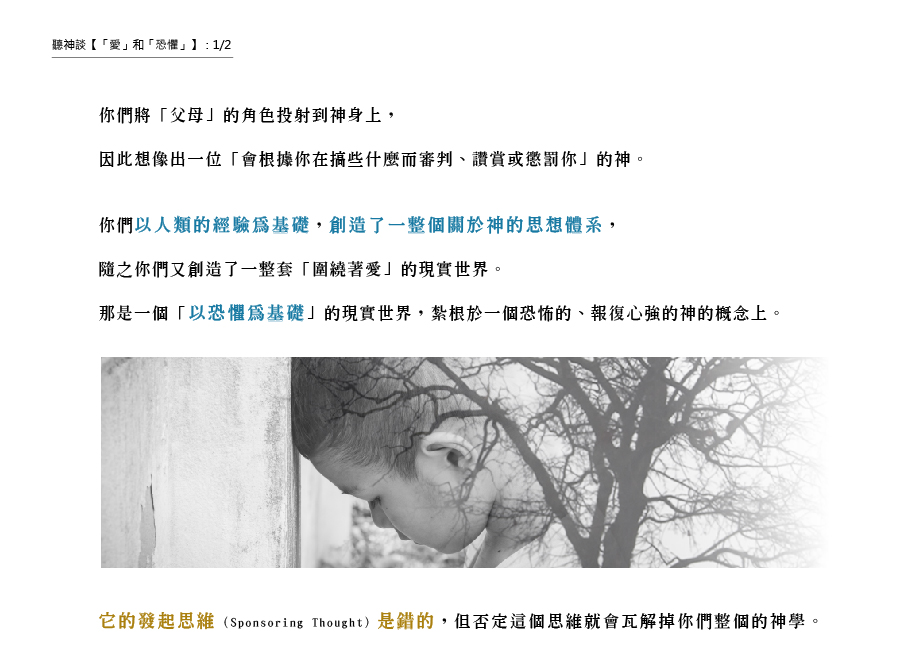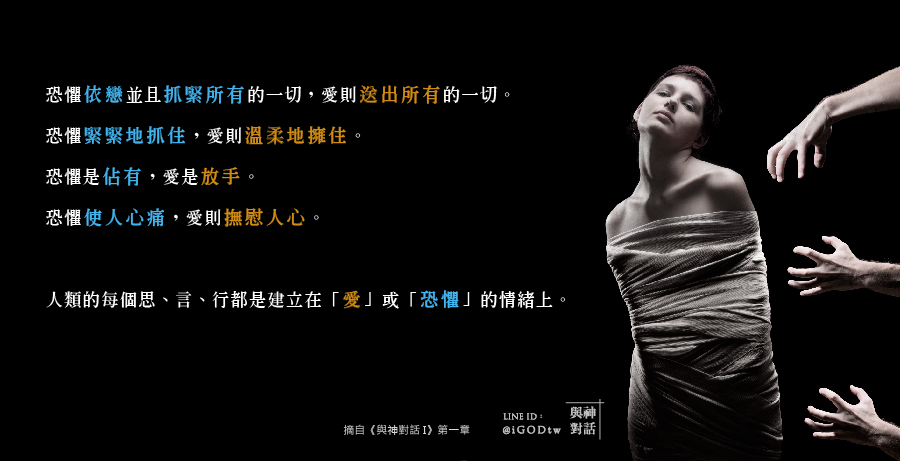
要真正了解和領悟「愛為何物」很不容易,最好的方法之一就是去了解其相反物。以下內容摘自《與神對話 I》第一章:
你已忘懷被無條件地疼愛是什麼感覺。你已不記得「神的愛」是什麼經驗。因此你以「你所看見世界裡的愛的樣子」為基礎,試圖想像神的愛的必然樣子。
你們將「父母」的角色投射到神身上,因此想像出一位神,他會根據你在搞些什麼而審判、讚賞或懲罰你。但這只是一個建基於你們的神話上之「對神的簡化觀點」。它與我是什麼(Who I Am)毫不相干。
就這樣,你們以人類經驗,而非靈性真理為基礎,創造了一整個關於神的思想體系之後,隨之你們又創造了一整套「圍繞著愛」的現實世界。那是一個「以恐懼為基礎」的現實世界,紮根於一 個恐怖的、報復心強的神的概念上。它的發起思維(Sponsoring Thought)是錯的,但否定這個思維就會瓦解掉你們整個的神學。雖然取代它的新神學才是你們真正的救世之道,你們卻無法接受,因為,一個「不被害怕、不會審判人、沒有理由會責罰你們的神」的這個想法,即使在你們對「神是誰和是什麼」之最偉大的想法裡,也簡直是太壯美而難以令人接受。
這個「以恐懼為基礎的愛」之實相,主宰了你們對於愛的經驗;事實上,創造了你們對於愛的經驗 。 因為,你們不僅看到自己接受了有條件的愛,你們也看著自己以同樣的方式付出愛。縱使當你保留、退避並設下你的條件時,你的某部分其實認為愛不應該是這樣的。可是,你仍然仿佛無力改變你送出愛的方式。你告訴自己,你是很辛苦才學到教訓的,如果你再次讓自己有弱點你就慘了。然而事實是,如果你不讓自己那樣,你才是慘。
〔藉著你們自己對於愛的 (錯誤) 想法,你們詛咒自己永遠不再經驗純粹的愛。因而,你們也詛咒自己無法認識真實的我。直到你願意的那一天。因為你無法永遠否認我,而我們和好的那一刻將會到來。〕
人類所採取的每一個行動,都是建立在愛或恐懼上,而非只是與人際關係有關的那些行動。影響著商業、工業、政治、宗教、你們給年輕人的教育、你們國家的社會議程、你們社會的經濟目標;每個涉及戰爭、和平、攻擊、防禦、侵略、認輸的抉擇;要垂涎或讓出、儲蓄或分享、聯合或分裂的決心——每一個你所做的自由選擇,都是出自這兩個僅有的可能思維之一:是一個「愛」的思維,或是個「恐懼」的思維。
恐懼是退縮、關閉、抽回、逃跑、躲藏、掠奪、傷害的能量。
愛是伸展、開放、送出、留駐、顯露、分享、治癒的能量。
恐懼以服裝包裹著我們的身體,愛則容許我們赤裸地站出來。

恐懼依戀並且抓緊我們所有的一切,愛則送出我們所有的一切。
恐懼緊緊地抓住,愛則疼愛地擁住。
恐懼是佔有,愛則放手。
恐懼使人心痛,愛則撫慰人心。
恐懼攻擊人,愛則改善關係。
人類的每個思、言、行,都是建立在「愛」或「恐懼」的情緒上。
摘自《與神對話 I》第一章
You have forgotten what it was like to be loved without condition. You do not remember the experience of the love of God. And so you try to imagine what God’s love must be like, based on what you see of love in the world.
You have projected the role of “parent” onto God, and have thus come up with a God Who judges and rewards or punishes, based on how good He feels about what you’ve been up to. But this is a simplistic view of God, based on your mythology. It has nothing to do with Who I Am.
Having thus created an entire thought system about God based on human experience rather than spiritual truths, you then create an entire reality around love. It is a fear-based reality, rooted in the idea of a fearful, vengeful God. Its Sponsoring Thought is wrong, but to deny that thought would be to disrupt your whole theology. And though the new theology which would replace it would truly be your salvation, you cannot accept it, because the idea of a God Who is not to be feared, Who will not judge, and Who has no cause to punish is simply too magnificent to he embraced within even your grandest notion of Who and What God is.
This fear-based love reality dominates your experience of love; indeed, actually creates it. For not only do you see yourself receiving love which is conditional, you also watch yourself giving it in the same way. And even while you withhold and retreat and set your conditions, a part of you knows this is not what love really is. Still, you seem powerless to change the way you dispense it You’ve learned the hard way, you tell yourself, and you’ll be damned if you’re going to leave yourself vulnerable again. Yet the truth is, you’ll be damned if you don’t.
[By your own (mistaken) thoughts about love do you damn yourself never to experience it purely. So, too, do you damn yourself never to know Me as I really am. Until you do. For you shall not be able to deny Me forever, and the moment will come for our Reconciliation.]
Every action taken by human beings is based in love or fear, not simply those dealing with relationships. Decisions affecting business, industry, politics, religion, the education of your young, the social agenda of your nations, the economic goals of your society, choices involving war, peace, attack, defense, aggression, submission; determinations to covet or give away, to save or to share, to unite or to divide—every single free choice you ever undertake arises out of one of the only two possible thoughts there are: a thought of love or a thought of fear.
Fear is the energy which contracts, closes down, draws in, runs, hides, hoards, harms.
Love is the energy which expands, opens up, sends out, stays, reveals, shares, heals.
Fear wrap our bodies in clothing, love allows us to stand naked.
Fear clings to and clutches all that we have, love gives all that we have away.
Fear holds close, love holds dear. Fear grasps, love lets go. Fear rankles, love soothes. Fear attacks, love amends.
Every human thought, word, or deed is based in one emotion or the other.

